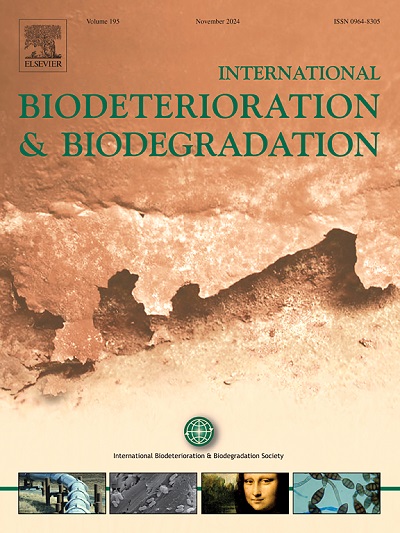Metabolic stress induced by nitrite enhances biocide kill of sulfate reducing bacteria in oilfield enrichments
IF 4.1
2区 环境科学与生态学
Q2 BIOTECHNOLOGY & APPLIED MICROBIOLOGY
International Biodeterioration & Biodegradation
Pub Date : 2025-03-21
DOI:10.1016/j.ibiod.2025.106067
引用次数: 0
Abstract
Biocides are commonly employed in oilfield settings to mitigate the activity of sulfate reducing bacteria (SRB) that cause biofouling, reservoir souring and microbiologically influenced corrosion. Key challenges of applying biocides in the oilfield include their environmental toxicity and the need to apply high concentrations to overcome their deactivation and degradation by chemical and physical conditions. One strategy to reduce biocide dosages and ecotoxicity is to apply chemicals that enhance their activity. Nitrite, a known metabolic inhibitor of SRB, was previously found to be synergistic in inhibiting sulfate reduction when used in combination with glutaraldehyde. In the present study, pre-treatment of an SRB enrichment with 2.0 mM nitrite to lower cellular ATP was found to enhance the biocidal activity of glutaraldehyde. These results revealed a linear relationship exists between the decrease in adenylate energy charge of an SRB enrichment and a 10,000-fold increase in planktonic SRB kill, supporting a mechanism that metabolic stress imposed by nitrite enhances the biocidal activity of glutaraldehyde. Furthermore, the results showed increasing nitrite pre-treatment times support lower doses of glutaraldehyde needed to achieve enhanced SRB kill while a nitrite concentration of less than 0.04 mM was effective suggesting nitrite is a very efficient biocide enhancer.
亚硝酸盐诱导的代谢应激增强了油田富集中硫酸盐还原菌的杀菌剂杀灭效果
杀菌剂通常用于油田环境中,以降低硫酸盐还原细菌(SRB)的活性,SRB会导致生物结垢、储层酸化和微生物影响的腐蚀。在油田中应用杀菌剂的主要挑战包括其环境毒性,以及需要使用高浓度杀菌剂来克服化学和物理条件下的失活和降解。减少杀菌剂剂量和生态毒性的一种策略是使用增强其活性的化学品。亚硝酸盐是一种已知的SRB代谢抑制剂,以前发现当与戊二醛联合使用时,在抑制硫酸盐还原方面具有协同作用。在本研究中,发现用2.0 mM亚硝酸盐富集SRB以降低细胞ATP的预处理可以增强戊二醛的生物杀灭活性。这些结果揭示了SRB富集过程中腺苷酸能量电荷的减少与浮游SRB杀死量增加1万倍之间存在线性关系,支持了亚硝酸盐施加的代谢应激增强戊二醛杀虫活性的机制。此外,增加亚硝酸盐预处理次数支持较低剂量戊二醛达到增强SRB杀灭效果,而亚硝酸盐浓度小于0.04 mM有效,表明亚硝酸盐是一种非常有效的生物杀灭剂。
本文章由计算机程序翻译,如有差异,请以英文原文为准。
求助全文
约1分钟内获得全文
求助全文
来源期刊
CiteScore
9.60
自引率
10.40%
发文量
107
审稿时长
21 days
期刊介绍:
International Biodeterioration and Biodegradation publishes original research papers and reviews on the biological causes of deterioration or degradation.

 求助内容:
求助内容: 应助结果提醒方式:
应助结果提醒方式:


